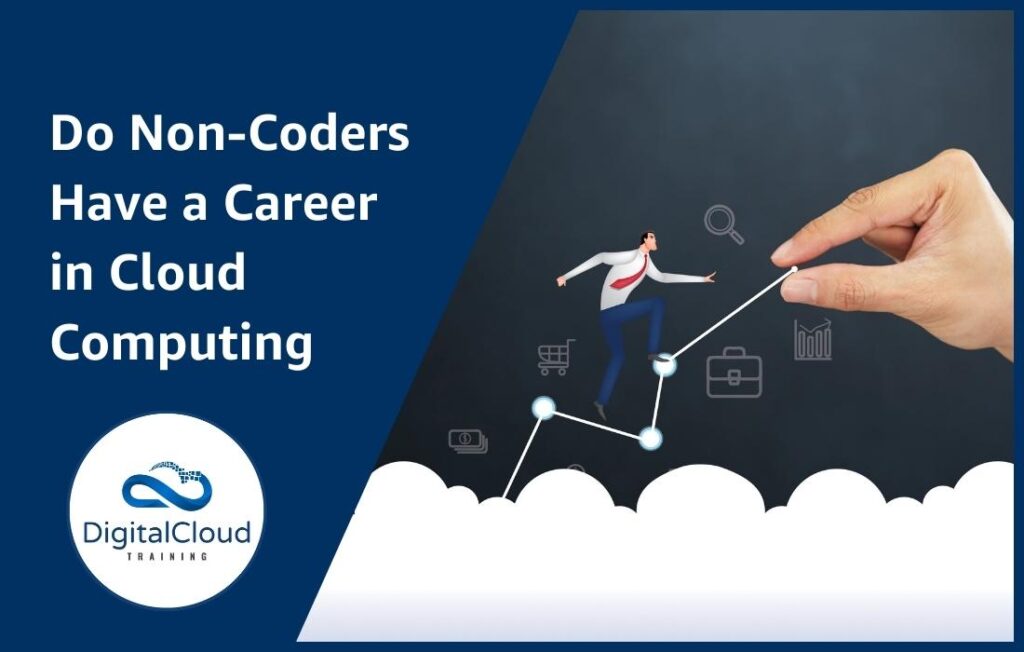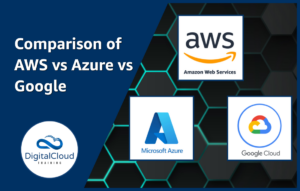Do Non-Coders Have a Career in Cloud Computing
Please use the menu below to navigate the article sections:

Cloud computing allows users to access computing resources (like servers, storage, and software) over the internet. Instead of setting up and maintaining their own computing infrastructure, companies can rent these resources on-demand from cloud providers like Amazon Web Services (AWS), Azure, and others.
Cloud computing brings immense benefits to users. It reduces IT costs by eliminating the need to buy and maintain computing infrastructure. It lets organizations scale their computing capacity up or down to respond to market changes. Using cloud computing, companies can try innovative ideas and test new technology without worrying about a long-term commitment to using cloud infrastructure.
Cloud computing has created a wealth of job opportunities, not only for coders but also for non-coders. In addition to traditional programming roles, there are now a multitude of positions critical to the success of any IT company that don’t require programming skills. These roles include IT business analysts, security consultants, and many others.
Today, we will explore the many exciting opportunities available for non-coders in the field of cloud computing. We will start with the role of programmers in cloud computing. Then, we’ll explore the diverse range of non-programmer roles in the world of cloud computing. Finally, we’ll provide guidance on how to develop the necessary skills to succeed in cloud computing as a non-coder.
The Role of Coding in Cloud Computing
Cloud computing involves creating and managing complex software systems that can run on large numbers of computers and storage devices. Software development is the major aspect of cloud computing which utilizes a different kinds of developers to deploy software solutions on the cloud. Whether it is a front-end developer, back-end developer, UI/UX developer, AI developer, or even QA automation developer, programming is at the core of all these roles.
Programming plays a critical role not only in software development, but also in cloud infrastructure automation. Whether you’re working with AWS CloudFormation or Terraform, you’ll be coding all of the infrastructure components and cloud services in the form of coded templates.
Most modern application development utilizes machine learning and computer vision to improve the accuracy and workflow of the application. Python is a major programming language used in AI-based software solutions.
While coding skills are essential for cloud computing professionals, these are not the only skills required for success in this field. Many non-coding roles in cloud computing are equally important for the success of a business application. Let’s discuss some of the non-coding roles.
Non-Coding Roles in Cloud Computing
Let’s explore some of the important roles in cloud computing that don’t require programming skills, and yet play a crucial role in cloud computing.
Agile Project Manager / Scrum Master: A project managers’ primary job is to oversee the planning, execution, and completion of cloud-based projects. They ensure projects stay on track, within scope, and within budget. In many modern IT organizations, Agile has become the most adopted development methodology, which has led to the emergence of a new role – the Scrum Master. While this role is similar to that of a project manager, its focus is on facilitating communication and collaboration between coders and customers to ensure the best possible outcomes. Scrum Masters are non-coders who play a critical role in keeping customers satisfied and projects on track.
IT Business Analyst: IT business analysts are responsible for identifying and addressing a company’s IT needs by analyzing their problems and developing comprehensive IT solutions. They possess a strong understanding of programming languages, cloud computing trends, and the technical components needed to solve specific business problems. By working with various departments within a company, IT business analysts can help to streamline processes, increase efficiency, and drive growth.
DevOps: DevOps teams are essential for optimizing the software development workflow by improving the build and release process. Their responsibilities include creating various CI/CD pipelines to automate code integration and deployment, assisting users with configuration, integration, and maintenance tasks, and ensuring rapid and stable product releases. While they may not be coders themselves, they possess a deep understanding of the software development process and work collaboratively to support the team in delivering high-quality software products.
Cloud Security Specialist: Cloud security specialists ensure that cloud-based infrastructure, applications, and data are secure and compliant with industry standards and regulations. They assess risks, implement security policies, and monitor for potential threats. While they may not be involved in coding, they must have a deep understanding of cloud security best practices and technologies. Rather than writing code, their focus is on identifying vulnerabilities and mitigating them through tools, software, and configuration.
Developing Technical Skills as a Non-Coder
Non-coders can acquire valuable cloud computing technical abilities that are applicable to a variety of non-coding positions. These skills can lead to opportunities for career progression and are vital for any firm utilizing cloud technologies. Let’s investigate how some of these technical talents can be useful in non-coding positions.
Cloud Architecture: Non-coders working as cloud architects, consultants, or project managers must understand cloud architecture. Non-coders can contribute to the planning and implementation of cloud projects by learning about cloud deployment methods (public, private, and hybrid), service models (IaaS, PaaS, and SaaS), and best practices for developing scalable and cost-effective cloud solutions. This information can be obtained through online courses, certifications, and hands-on experience with cloud platforms like AWS, Azure, and Google Cloud.
Cloud Security: Security is a significant priority for firms utilizing cloud services. Non-programmers who work in cloud security or as consultants can benefit greatly from studying encryption, access control, network security, and compliance standards like GDPR and HIPAA. By gaining experience in these areas, they may assist firms in identifying and mitigating potential security threats, designing secure cloud solutions, and ensuring regulatory compliance. Certifications such as the Certified Cloud Security Professional (CCSP) can be excellent for acquiring and validating cloud security expertise.
Data Analysis: Cloud computing frequently involves enormous volumes of data, and non-coders might acquire skills in data analysis to work as data analysts, business analysts, or consultants. Non-programmers may analyze data, produce insights, and make data-driven decisions by gaining knowledge of data storage and processing platforms such as BigQuery, Redshift, or Snowflake and data analysis tools such as Excel, R, or Python. This skill set can be important for maximizing cloud resources, directing company initiatives, and providing stakeholders with relevant insights.
Networking: Networking is an essential part of cloud computing, and non-programmers can benefit from knowing about network structures, protocols, and virtualization technologies. This information is useful for cloud architects, consultants, and support experts who must design, configure, and troubleshoot cloud network issues. Certifications such as AWS Certified Advanced Networking can assist non-programmers in developing and demonstrating their networking competence.
DevOps and Automation: DevOps approaches are extensively embraced in cloud environments, and non-coders can benefit from a grasp of DevOps’ guiding ideas and technologies. CI/CD, infrastructure as code (IAC), and tools such as Jenkins, Docker, and Kubernetes allow non-coders to work more closely with development and operations teams, streamline procedures, and enhance cooperation. This information is useful for positions like DevOps engineers and project managers.
Cloud Cost Optimization: Cost management has become a top priority as more businesses utilize cloud services. Non-programmers can build cloud cost optimization abilities by studying billing, cost management tools, and ideas for decreasing cloud expenditures. This knowledge can be useful for cloud consultants, architects, and project managers, who can assist businesses in optimizing their cloud spending and achieving a higher return on investment (ROI).
Conclusion
This article highlighted the diverse career opportunities available in the cloud computing industry for non-coders. While coding is undoubtedly crucial, various other roles are equally necessary for the success of cloud computing initiatives. A wide range of non-programming responsibilities must be fulfilled to make cloud computing a potent and effective technology. These include project management, cloud architecture, DevOps, IT business analysis, data analysis, and many more.
Acquiring technical skills related to cloud computing, such as cloud architecture, security, and data analysis, can also be very beneficial even for individuals who don’t work in coding as it may open doors for career advancement. Almost every modern software developed is cloud-native, and all the non-coding skills mentioned above are crucial for the success of these applications.
Demand for cloud computing experts is on the rise, and even those who aren’t proficient in coding can find rewarding work in this sector. Non-coders can play a crucial role in helping businesses reap the benefits of cloud computing through acquiring technical skills. With the increasing demand for cloud computing, the opportunities for professional growth in this field are endless.
Ready to Take Your Tech Career to the Next Level?
At Digital Cloud Training, we’re dedicated to your success. Our courses offer up-to-date content, equipping you with the expertise to stand out in the competitive tech job market.
Our On-Demand Training allows you to learn at your own pace, fitting seamlessly into your schedule. Dive into the world of cloud computing whenever and wherever suits you best.
But we don’t stop at theory. Our Challenge Labs provide practical, real-world scenarios where you can apply your newfound knowledge without the risk of unexpected cloud costs. Gain hands-on experience and sharpen your skills.
For those seeking an immersive experience, our Cloud Mastery Bootcamp delivers live, job-ready training. Led by industry experts, this accelerated program can get you certified faster than you thought possible.
It’s time to propel your tech career forward. Join us at Digital Cloud Training and unlock your full potential in the world of cloud computing.





Responses